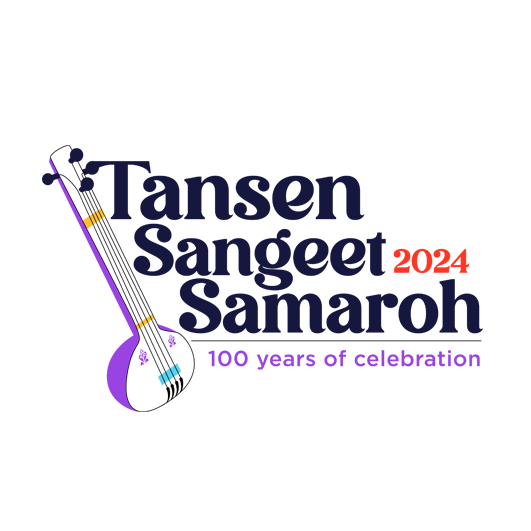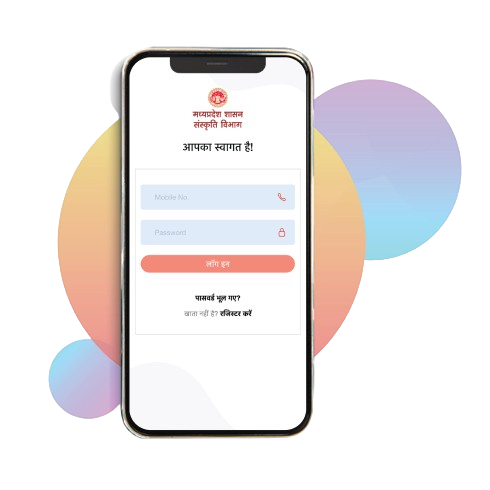ABOUT TANSEN
Celebrating a Century of Musical Excellence 100th World Music Festival (Tansen Samaroh) 2024
Music Maestro Tansen (born 1493 or 1506 as Ramtanu Pandey – died 1586 or 1589 as Tansen) was a prominent Indian classical music composer, musician and vocalist, known for a large number of compositions, and also an instrumentalist who popularised and improved the plucked rabab (of Central Asian origin). He was among the Navaratnas (nine jewels) at the court of the Mughal Emperor Jalal ud-din Akbar. Akbar gave him the title Music Maestro, an honorific, meaning learned man.

- Born in the house of Makarand Pandey in Behat village near the music city Gwalior, this child blessed with extraordinary talent was known as Ramtanu or Tanna in his childhood. Having flourished in music from Swami Haridas of Vrindavan, that child later became famous as Tansen. In his early days, Gwalior was ruled by the art-loving king Raja Mansingh Tomar. With his encouragement, Gwalior became a famous centre of music art, where great music teachers and singers like Baiju, Baksu and Mahmood were gathered. With their cooperation, Mansingh Tomar invented and promoted the Dhrupad singing style of music. Tansen was born and received his musical education in such an environment. It is likely that he received his early education from the famous musicians of Gwalior, which may also include famous musicians like Baksu and Mahmood.
- With the death of Mansingh Tomar and Vikramaditya losing the reign of Gwalior, the group of musicians there started disintegrating. In that situation, it did not seem possible for Tansen to receive higher education in Gwalior. Hence, he went to Vrindavan sometime after 1576. Where he received higher education in music from Swami Haridas ji. In his later life, he also learnt Kirtan method of singing from the music teacher of Ashtachhap, Govind Swami. Sufi Fakir Gaus Muhammad was a devotee of Tansen, but it does not seem to be authentic that he was Tansen's music teacher.
- After becoming proficient in music, Tansen left to earn his livelihood. He first stayed under the shelter of Daulat Khan, son of Sher Shah Suri and then was appointed as the court singer of King Ramchandra of Bandhavgarh. While living in Bandhavgarh, he received immense wealth, glory and respect and he became widely famous. When Mughal emperor Akbar heard the praise of his singing, he called him to his court and gave him a place among his nine gems. Thus, Tansen entered the Akbari court in 1619-20. Tansen's fame spread throughout the country due to his patronage under Akbar. He received unprecedented respect and immense wealth from the Mughal emperor. When Akbar wanted to listen to the wonderful music of Swami Haridas, he went to Vrindavan in a different disguise around 1623. There, he heard the divine music of Swami Ji due to the efforts of Tansen.
- In Aaina Akbari written by Abul Fazal, the names of Mansingh Tomar's singers have been written as Baksu, Machchu and Bhanu, whereas Fakirullah has written their names as Baksu, Mannu, Karna and Mahmood. In legends, Baiju is said to be the main singer of Mansingh Tomar, but his name is not written by either Abul Fazal or Fakirullah. It is said about all the above singers that they made the Dhrupad singing invented by Mansingh Tomar popular through their singing, due to which it got widespread publicity. Out of those singers, no account is available about Machchu, Bhanu, Mannu, Karna and Mahmood, nor their compositions are available.
- Baksu is mentioned episodicly in the texts of Abul Fazal and Fakirullah and some Dhrupads composed by him are also found. Baiju is not mentioned in the texts of history, but he is discussed a lot in legends and traditions. Dhrupads composed by Baiju are also available in sufficient numbers. From this it is known that though there is no written account available about Baiju, his existence cannot be denied. There is so much similarity in the name, time, patron, music, style and compositions of Baksu and Baiju that some scholars have expressed the possibility of both of them being the same person. Now it is almost certain that both of them were different singers, although both were dependent on Mansingh Tomar, the great singer of the contemporary Dhrupad style.
- Abul Fazal has praised Tansen's singing the most and has written about Baksu that apart from Tansen, he was the most praiseworthy singer of his time. He was first in the court of Mansingh Tomar and then under the protection of his son Vikramajit. When Vikramajit lost Gwalior state due to defeat by Ibrahim Lodhi, then he went under the protection of the famous singer, King Kirat of Kalinjar. From there, he was called to the court of music-loving Sultan Bahadur Shah of Gujarat (reign 1583-1593). Some of the dhrupads composed by Baksu are also available. Some of them have been compiled in the famous work of North Indian music 'Raag Kalpadrum' edited by Shri Krishnanand Vyas. Still, they are not found in as many numbers as those of Tansen and Baiju. From this, it is assumed that perhaps he did not compose many dhrupads. But this is not the case. He actually composed several thousand dhrupads, out of which one thousand of the best compositions were compiled during the period of Shahjahan.

